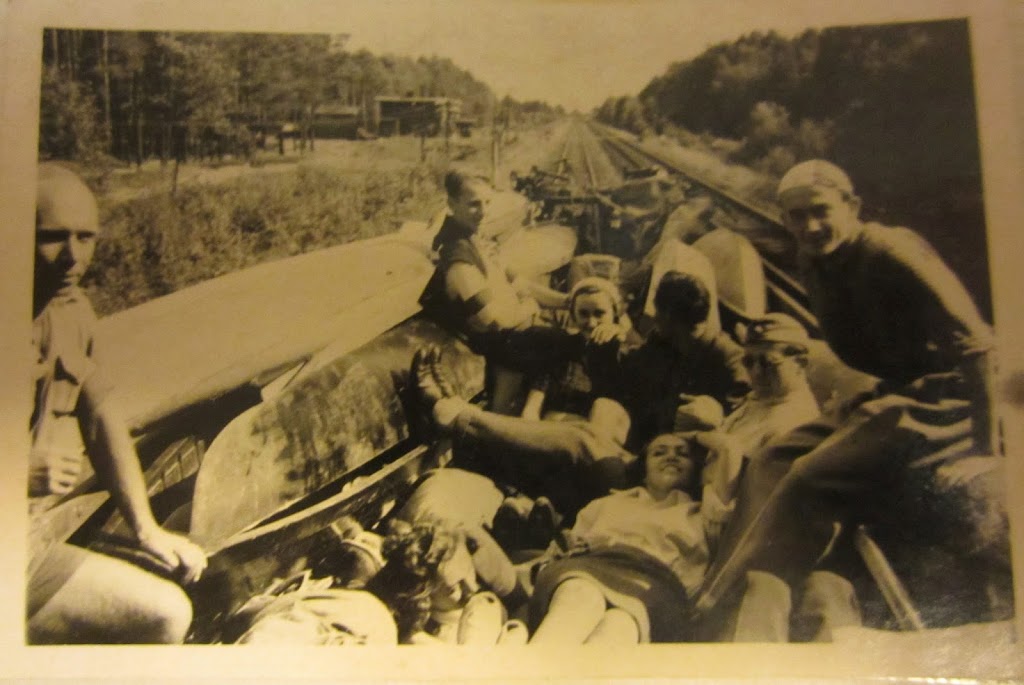Henry and I are looking at pictures in his photo album. He points to a photo of happy, young people lounging in a kayak or boat, on a train. Henry is to the far right, looking into the camera.
 Now that was a good time. We took my students and about 35 students from the university to summer camp in Szczecin, a little port town on the Baltic Sea. We took both boy and girl swimmers, and also track and field athletes. Only the best athletes were chosen for this trip. That summer we left with two cars, and came back with four wagons, fully loaded with the same people. (I think ‘wagons’ to Henry is equivalent to train cars.)
Now that was a good time. We took my students and about 35 students from the university to summer camp in Szczecin, a little port town on the Baltic Sea. We took both boy and girl swimmers, and also track and field athletes. Only the best athletes were chosen for this trip. That summer we left with two cars, and came back with four wagons, fully loaded with the same people. (I think ‘wagons’ to Henry is equivalent to train cars.)After the war, the Germans were chased back to Germany, and only allowed to take 20 pounds, like they did to us. There were rich abandoned German villas all over the place. Everything was left behind; grandfather clocks were still ticking, the furniture intact. We could take anything we wanted.
The Polish government told us to go in and take what we want. The whole town was ours to take what we wanted. The government didn’t give a shit about the houses; there were hundreds like that. They let the students go in and take what they wanted as a ‘gift’ from the communist regime. In that way, they wanted the students to come back and brag about how good it is to go to school and learn about Marx and Lenin.
So each of us athletes split up maybe five or six students per villa. I went with a couple of guys from the rowing section to look through some warehouses near the port. In one of the warehouses we found skiffs, long row boats for one person. The name of the Krakow sport club was still inscribed on the skiffs. The Germans stole the skiffs from us, so now we get to steal them back. We took the skiffs back with us on the train to take back to Krakow.
I also found some motor boats, which I later sold for 400 zlotys each. – Henry Zguda
Note – When Henry first told this story about ‘stealing whatever they wanted from German villas’ I was a little surprised and not sure I wanted to include it. Fast forward 12 years and I’ve done my research to better understand that German-Polish borders changed three times (before, during and after WWII.) Given the huge plunder Germans did to Poland as well as evicting thousands of Poles – turnabout seems very fair play in this case.
The town of Szczecin was the German town of Stettin before the war. It’s a beautiful city that served as the base of operations for the motorized infantry to cut across Poland. More than 135 forced labor camps were set up in this town; all Jews were evacuated to Lublin.
Note – When Henry first told this story about ‘stealing whatever they wanted from German villas’ I was a little surprised and not sure I wanted to include it. Fast forward 12 years and I’ve done my research to better understand that German-Polish borders changed three times (before, during and after WWII.) Given the huge plunder Germans did to Poland as well as evicting thousands of Poles – turnabout seems very fair play in this case.
The town of Szczecin was the German town of Stettin before the war. It’s a beautiful city that served as the base of operations for the motorized infantry to cut across Poland. More than 135 forced labor camps were set up in this town; all Jews were evacuated to Lublin.
